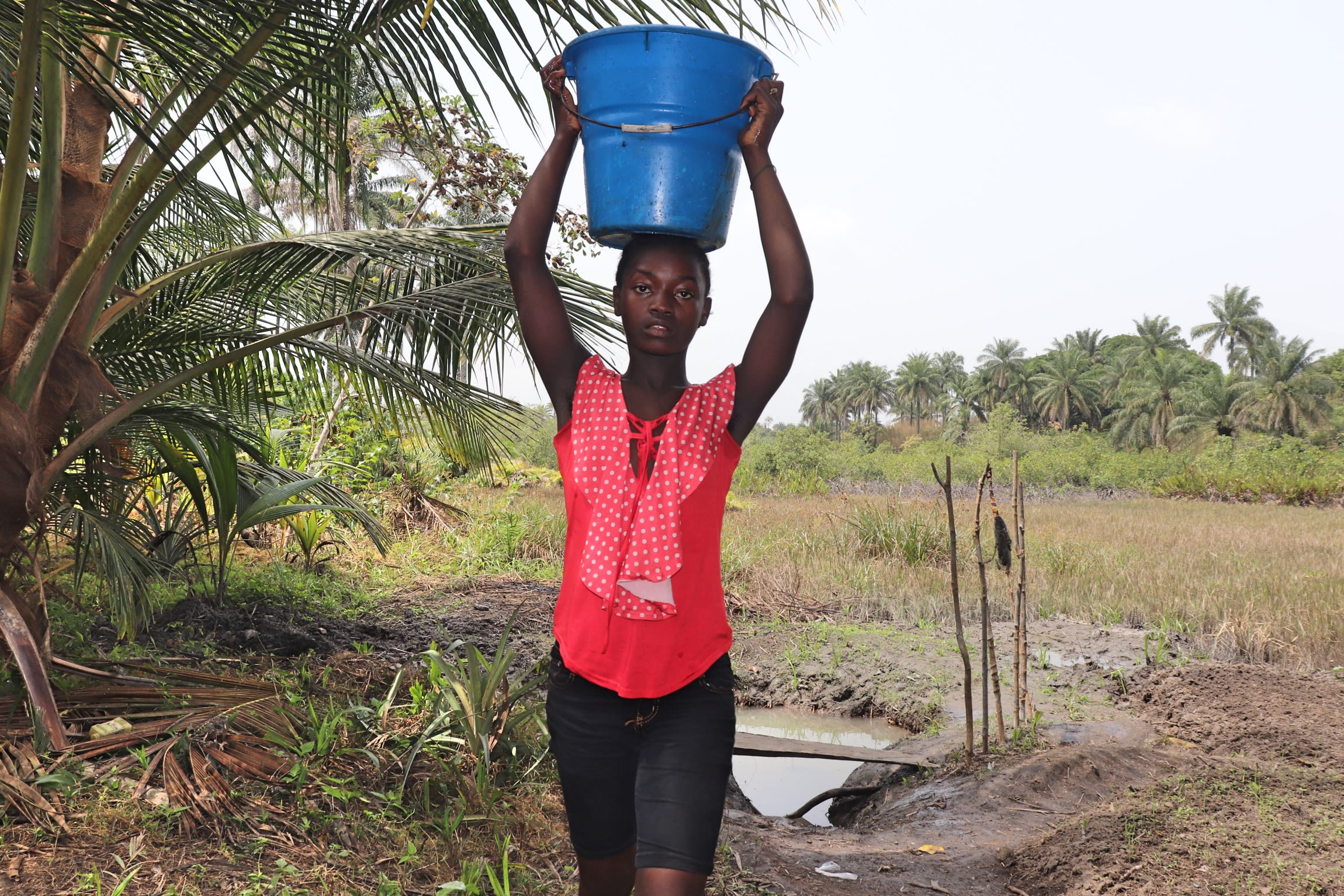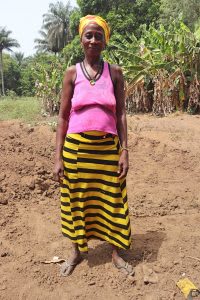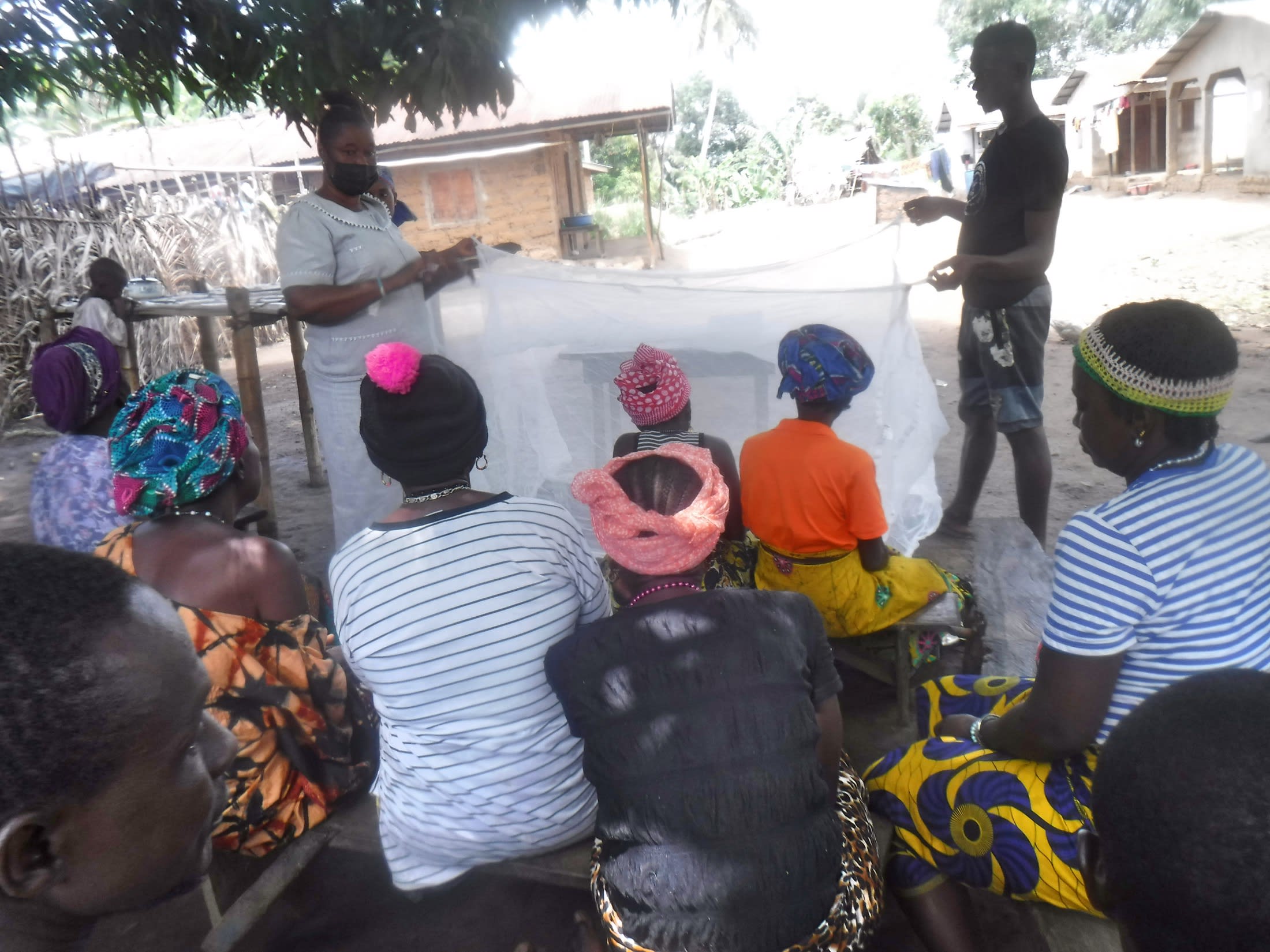Most of the 512 people in Kriema Kiamp send their children to the cities to avoid a harsh life in the village. The children visit only during harvest time when food is plentiful. For the rest of the year, life in Kriema Kiamp is hard.
In the center of Kriema Kiamp stands a broken well whose well pad is crumbling. When the community members called the organization that had installed the well for them to have it repaired, the organization charged a consultation fee, which the villagers saved for months to scrounge up. Then, the organization never showed. That was years ago—years in which the only sources of water for Kriema Kiamp have been a hand-dug well in the swamp and a far-away stream.
The water quality of the current main water source is pathetic. Looking down into the gaping hole of the well, you can see tree branches, fallen leaves, worms, and cockroaches. No wonder infant mortality is so high in Sierra Leone.

14-year-old Adama B. (in the above photo) is one of the few children left in Kriema Kiamp.
"I come from a poor family and we cannot afford to buy plastic sachets of water," Adama said. "We have no choice but to drink swamp water every day. I always say a prayer before drinking water because I know it is dirty and not good for my health, but there is no other option. I am looking forward [to] this project so I can do laundry, fetch drinking water, and no longer have to walk far with no shoes.
"From an early age, I started to carry buckets of water on my head and have gotten used to the weight," Adama continued. "As a girl living in the village, I am expected to do all the domestic work while my brothers are encouraged to attend school and learn how [to] climb palm trees and other jobs that are for boys.
"As far as I can remember, it has not been easy trying to get water every morning. To fetch drinking water, I walk a far distance. Going to school late is a regular thing. I usually fetch water at night so I will have more time to do my other chores before I start the three-mile walk to school. Having a well in the village is going to help the students do other chores around the house before going to school.
"I started doing work that was meant for older people from a young age [because] carrying water and other heavy items on my head has helped me to be a lot stronger earlier. Once in a while, I feel pain in my neck and feet. Walking far distances to the swamp without shoes has damaged some of my toenails. I will be the happiest person in the village when the water well is completed because it will provide clean water that we have not had for the longest time."
 42-year-old farmer and trader Fatu Sesay (in the photo to the right) knows water is a precious commodity. "The water we use is guarded with great care, and no wastage of this is ever allowed in the village because what we go through in a day is what others go through in a year," Fatu said.
42-year-old farmer and trader Fatu Sesay (in the photo to the right) knows water is a precious commodity. "The water we use is guarded with great care, and no wastage of this is ever allowed in the village because what we go through in a day is what others go through in a year," Fatu said.
"I depend on the produce from the harvesting of my palm kernel to produce palm oil, but with the only source of water far away, most of the palm kernel will not be harvested, because there is no sufficient water to do such a job," Fatu continued.
"Harvesting palm oil requires the use of a large amount of water. With no source for such water, [my] livelihood income takes another negative hit, which, in turn, will translate to increased poverty. The time the rains start is too late to harvest the palm trees because what palm trees hate is too much water. They will easily rot.
"The major ingredient in preparing good food is having access to clean and safe water. This project is going to improve the lives of everyone in the village. I have seen other villages that have benefited from [your organization]. The village that holds the open market can now boast of having four water wells. I pray the same goodness gets to my village."
A working well will alleviate the people of Kriema Kiamp's health concerns and provide them with a hand up out of the poverty that has kept them unhealthy and made them send their children away for most of the year.
What we can do:
New Well
Where we will be drilling is centrally located and will relieve many people of the long journey to fetch water and the challenge of accessing clean water.
Our team will drive over the LS200 mud rotary drill rig and set up camp for a couple of nights. Once the well is drilled to a sufficient water column, it will be cased, developed, and then tested. If these tests are positive, our mechanics will install a new India Mark II pump.
By drilling this borehole, Kriema Kiamp and the surrounding community will be provided with plenty of accessible, clean drinking water.
Training
There will be hygiene and sanitation training sessions offered for three days in a row.
Community members will learn how to make a hands-free handwashing station called the "tippy-tap." We will use these tippy taps for handwashing demonstrations and will also teach about other tools like dish racks and the importance of properly penning in animals. We will highlight the need to keep restrooms clean, among many other topics.
This training will also strengthen a water user committee that will manage and maintain this new well. They will enforce proper behavior and report to us whenever they need our help in solving a serious problem, like a pump breakdown.



 Rehabilitation Project
Rehabilitation Project
















